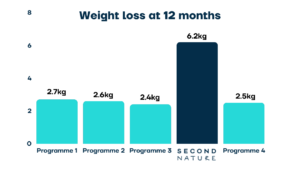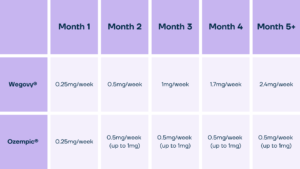What if I’m not eating enough on Ozempic?
Some people on Ozempic will find the medication is so effective at lowering appetite that they struggle to eat enough calories to support their body’s primary functions, like digestion.
The first thing to do if this happens is speak with your doctor or prescribing pharmacist, who’ll be able to discuss this with you in more detail.
From a nutrition perspective, here are our top tips for eating enough calories on Ozempic:
- Ensure a source of high-quality protein at every meal
- Eat three main meals a day, even if you’re not hungry
- Include high-protein snacks in between meals if your meal portions are very small
- Make food more palatable by seasoning to taste
- Make food easier to digest by cooking vegetables, mincing meat, and eating ‘softer’ foods
Should I buy Ozempic online?
Ozempic is no longer available in the UK as a weight-loss medication. However, Wegovy and Mounjaro are now available and approved for weight loss in the UK.
Wegovy and Mounjaro shouldn’t be viewed as the silver bullet to ‘cure’ obesity.
Instead, they should be used to help you kickstart your weight loss while you develop the healthy habits you need to maintain the weight loss in the long term.
Ideally, we’d be able to lose weight without medication and lifestyle changes would be enough to support weight loss in the long term.
We’d generally recommend trying Second Nature’s weight-loss programme before considering a weight-loss jab.
Changing your habits is the most sustainable way to achieve long-term weight loss, and it’s also less expensive.
At Second Nature, we’ve been used by the NHS since 2017 to support people with type 2 diabetes and obesity to lose weight, manage their blood sugar levels, and lead healthier lifestyles for the long term.
In 2022, the NHS published data in the BMJ that compared the weight loss outcomes of five providers in the National Diabetes Prevention Programme.
Second Nature was more than twice as effective at supporting weight loss than the other four providers.

However, if you’ve decided to try Wegovy or Mounjaro but need support in making positive changes to your lifestyle, Second Nature could be an option for you. But it’s worth noting that we have strict eligibility criteria.
Otherwise, keep reading as we dig into the science of Ozempic and how GLP-1s work.
1) How does Ozempic work?
When we eat food, our stomach releases a hormone that helps the body regulate hunger and blood sugar levels. This hormone is called GLP-1 (glucagon-like peptide-1). The actions of GLP-1 are the target of Ozempic.
Ozempic and this class of medications are known as GLP-1 receptor agonists (GLP-1s). They mimic the actions of the hormone GLP-1.
Ozempic helps your pancreas release more insulin to lower blood sugar levels, delay emptying food from the stomach (also called gastric emptying), and lowers hunger by communicating directly with the brain’s appetite control centre, the hypothalamus, to lower food-seeking behaviours.
Click here to learn more about how GLP-1 receptor agonists like semaglutide work.
Key points:
- Ozempic is a GLP-1 receptor agonist and mimics the hormone called GLP-1 to lower blood sugar levels by helping the pancreas release the hormone insulin
- Ozempic lowers hunger by communicating directly with the brain’s appetite control centre, the hypothalamus. This action lowers food-seeking behaviour.
- Ozempic also slows gastric emptying, which means that food will take longer to move from the stomach and through your digestive system
2) How much weight will I lose on Ozempic?
Research suggests that Ozempic supports average weight loss of around 6kg after 40 weeks. However, as this is an average, it’s unclear how much weight each individual will be able to lose on Ozempic.
The amount of weight people lose on Ozempic will depend on how well they respond to the medication and their ability to make positive changes to their diet and lifestyle.
Semaglutide reduces appetite and hunger, helping you eat fewer calories; this effect is almost immediate.
Semaglutide is a long-acting medication that’s started at a lower dose to reduce the number and severity of side effects as it’s built up to a higher maintenance dose.
How does Ozempic compare to weight loss without medication?
Lifestyle interventions without semaglutide tend to lead to an average weight loss of around 5-10%.
Losing and maintaining weight loss of more than 10% is associated with significantly reducing complications related to obesity, including hypertension, type 2 diabetes, and heart disease.
A recent paper published in The Lancet showed that nearly 20% of participants in lifestyle interventions without medications gain weight, around 40% lose between 1-10% of their body weight, and just 13% lose more than 10%.
In comparison, less than 5% of participants combining semaglutide with lifestyle interventions gain weight, around 10% lose between 1-10%, and 87% lose more than 10%.
So, 47% more people lose more than 10% of body weight on lifestyle interventions with semaglutide compared to lifestyle interventions alone.
Key points:
- Research suggests Ozempic leads weight loss of around 6kg on average
- Some people will respond better to Ozempic and lose more, other will lose less
- Lifestyle interventions without semaglutide average around 5-10% weight loss, and less people achieve clinically significant weight loss without semaglutide
3) What’s the difference between Wegovy and Ozempic?
The only difference between Wegovy and Ozempic is the available dose, with Wegovy available up to 2.4 mg, compared to 1 mg with Ozempic.

Initial research on semaglutide focused on Ozempic® and doses between 0.5 mg and 1 mg. However, the studies found that 20-30% of individuals on the medication didn’t reach the treatment targets for reducing their blood sugar levels.
A randomised controlled trial with 961 participants compared the impact of a once-weekly dose of 1mg or 2mg of semaglutide on blood glucose levels and weight loss for people living with type 2 diabetes.
You might expect that a doubling of the dose would lead to a doubling of the effect.
However, the human body is a bit more complex than that. Medications (and hormones in the body) often have a ‘ceiling effect’ where the relationship between the exposure and the effect is no longer linear.
The results showed that 1 mg of semaglutide reduced HbA1c (average blood glucose) by 1.9% compared to 2.2% in the 2 mg group.
A similar trend was shown with weight loss. 1 mg of semaglutide led to an average weight loss of 6 kg compared to 6.9 kg in the 2 mg group. Interestingly, both groups reported similar levels of adverse events and side effects.
So, the higher dose of semaglutide that you’ll receive with Wegovy will likely lead to more significant reductions in weight loss and blood sugar levels without experiencing more adverse events or side effects.
However, you must monitor your medication responses and determine your tolerance level. You might tolerate a higher dose, but you might not.
The research on these medications has shown that the most severe side effects are reported when the dose of the medication is increased while your body adjusts.
You might determine that any side effects are worthwhile to help you improve your health conditions and lose weight. But you must contact your healthcare team and discuss any side effects to ensure this is monitored and the dose adjusted to suit your needs.
Key points:
- Most research with semaglutide is with the doses of 0.5 mg, and 1mg that you have with Ozempic
- Only one trial has compared the impact of 1 mg to 2 mg of semaglutide and found it did lead to more significant reductions in weight and blood sugar levels
- However, the differences weren’t as significant as you might expect and the dose that’s best for you will depend on your tolerance level and weight loss goals
- You must report any side-effects with your healthcare team and adjust your dose accordingly
Take home message
Weight-loss injections are designed as additional tools for weight management interventions and shouldn’t be considered lifelong medications.
Instead, they should be used to help you kickstart your weight loss and healthy journey while you commit to living a healthier lifestyle.
Consider the use of antidepressants for people living with depression. They’re not designed to cure the condition. Instead, they’re designed to allow room for therapy to treat the condition’s underlying cause.
Ozempic and other weight loss injections, like Mounjaro, are similar. They can allow you to make lifestyle changes to support long-term weight loss maintenance.
Ozempic can help silence food-related thoughts and also give you a boost of confidence with more immediate weight-loss results.
This helps to buy you the time and headspace to understand why your body may have struggled to lose weight previously, and to build new long-term healthy habits.
The core focus of our medication programmes is to calm down the feeling of food noise, lower your cravings, and allow you to build healthier habits to keep the weight off for good.
The ultimate goal is to make losing weight feel second nature.
Second Nature’s medication programme
Second Nature currently provides Mounjaro as part of our Mounjaro weight-loss programme. Ozempic is no longer available in the UK for weight loss.
Why should you choose Second Nature over other medication providers if you’ve decided to try Mounjaro (assuming you’re eligible)?
For peace of mind.
Second Nature has worked with the NHS for over 6 years providing weight-loss programmes across the UK.
While our Mounjaro weight-loss programme is private and not currently used by the NHS, we’ve built the programmes focusing on scientific evidence, patient safety, and data security.
We hope that our 6+ years of working with the NHS and building a track record of effective weight-loss results will give you peace of mind to give us a try.






